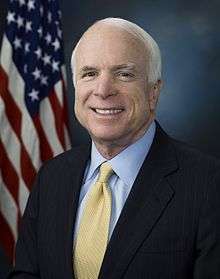Climate Stewardship Acts
The Climate Stewardship Acts are a series of three acts introduced to the United States Senate by Senator John McCain (R-AZ) and Senator Joseph Lieberman (ID-CT), with a number of other co-sponsors. Their aim was to introduce a mandatory cap and trade system for greenhouse gases, as a response to the threat of anthropogenic climate change. All three acts failed to gain enough votes to pass through the senate.
2003 Climate Stewardship Act
The first Act (S. 139, H.R. 4067) was defeated in the U.S. Senate by 55 votes to 43.[1][2]
If passed, it would have capped 2010 CO2 emissions at the 2000 level. Residential and agricultural areas, as well as other areas deemed "not feasible", would be exempt. As such, approximately 85% of the United States' emissions would have been covered for the year 2000. The bill would have also established a scholarship at the National Academy of Sciences for those studying climatology.[1]
2005 Climate Stewardship and Innovation Act
Under a slightly modified title, but with similar provisions, the Act (S. 1151) was reintroduced to a new Congress. The Act now called for the federal government to play a lead role in researching and commercialising new energy technologies, and particularly nuclear plant designs.[3] This bill also would provide for the trading of emission allowances and reductions as Climate Change Credits.[4]
The bill was defeated 38 Yea to 60 Nay.[5]
Climate Change Credit Corporation
Allocation of special Emission Permits by the Climate Change Corporation (to be created as part of the Climate Stewardship and Innovation Act) was intended to provide funding for assistance for consumers and industry to fully comply with the act. Permits would be allocated to support the activities of a Climate Change Credit Corporation, a combination public and private agency that would oversee the cap and trade program, provide credit (Climate Change Credits) to participating entities for reductions in the total greenhouse gases made before 2012, and to facilitate transition for industries with competitiveness concerns and fewer options for efficient energy reduction technology. These credits are limited but can be used, bought, or sold.[6]
2007 Climate Stewardship and Innovation Act
The substantional strengthening of this Act (S. 280) involved the provision for the emissions cap, immobile in previous Acts, to be gradually reduced, following the theory of contraction and convergence. It was co-sponsored by eleven senators and also received endorsements from the National Wildlife Federation, Environmental Defense, and the Pew Center on Global Climate Change, now the Center for Climate and Energy Solutions.[7]
Reductions in emissions under the Act would be to 2004 levels by 2012, 1990 levels by 2020, and 60% below 1990 by 2050. The 60% target is the level posited for the forthcoming UK Climate Change Bill.
The Act died after being referred to committee, without a vote of the full Senate.[8]
See also
- Stewardship
- Tradable allowance
References
- "Summary of the Lieberman-McCain Climate Stewardship Act". Center for Climate and Energy Solutions. Archived from the original on 2012-02-05. Retrieved 2012-06-07.
- "All Information (Except Text) for S.139 - Climate Stewardship Act of 2003". U.S. Congress. 2003.
- "White House Left Out in the Cold on Warming". IPS. 2007-01-23. Archived from the original on 2007-02-14. Retrieved 2008-04-25.
- "Summary of The Lieberman-McCain Climate Stewardship Act of 2003". Center for Climate and Energy Solutions. 2003. Archived from the original on 2012-02-20. Retrieved 2020-01-21.
- "Vote On the McCain Amendment". Retrieved 2009-10-22.
- Moore, Patrick. "Nature, not Human Activity, Rules the Climate". Climate Change Credit. Retrieved 2020-01-21.
- "Lieberman, McCain Reintroduce Climate Stewardship and Innovation Act". Joe Lieberman, United States Senator. 2007-01-12. Archived from the original on 2008-04-20. Retrieved 2008-04-24.
- "Climate Stewardship and Innovation Act of 2007 (2007 - S. 280)". GovTrack.us. Retrieved 2020-01-21.
